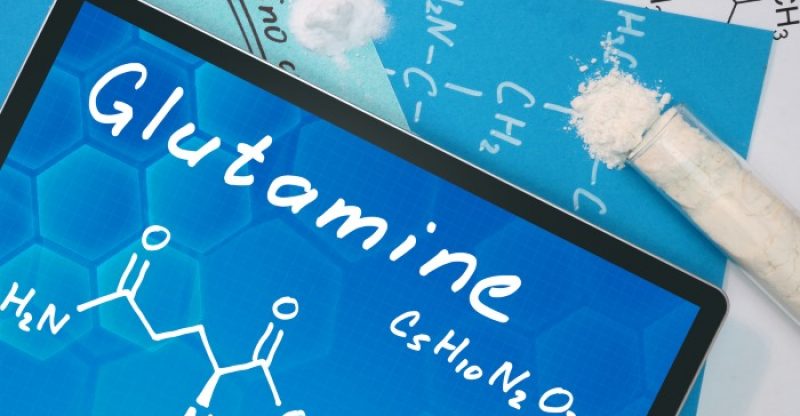15 Evidence-Based Benefits of L-Glutamine
L-glutamine is one of the vital amino acids that is found in abundant quantities in the body.
It is used as a supplement for people building muscles.
In addition, it is used to heal wounds inside the gut, boost health, and prevent muscle loss in people with certain diseases.
This supplement has many health benefits, and it’s a great supplement for everyone — not just bodybuilders.
What is L-Glutamine?
Glutamine is an amino acid.
Amino acids are building blocks for proteins, which make up most of the muscle mass in the body.
Out of all the amino acids, glutamine makes up 60% of all the muscle mass.
It is composed of an amino-acid compound and glutamic acid.
In some cases, it may become essential, and it may need to be taken either with food or in powder form.
Therefore, synthesis is reduced in the body.
Naturally, it is synthesized in the skeletal muscles by a glutamic enzyme.
Stress, inflammation, and physical trauma require increased amounts of it, so as a supplement, it elevates the essential amounts.
Cells in the intestines use glutamine as a fuel source more than glucose.
It is highly beneficial for improving brain and gut health, building muscle, and enhancing athletic performance.
This amino acid tackles sugar levels in the blood.
This molecule keeps the nitrogen levels in the body balanced, which is essential for life.
So taking this amino acid in supplement form can go a long way to improving health.
Health Benefits of L-Glutamine
Muscle Building
L-glutamic acid is popular among bodybuilders and athletes, in order to boost the muscle-building process.
Supplementation has not been extensively studied.
Researchers have noted that consuming it with glucose decreases the glutamic acid inside muscle cells, and reduces the production of it inside the body.
However, small supplementations with it have not shown to change athletic performance, increase the capacity of reducing acidity in the body, improve immunity, relieve muscle pain after extensive exercise, create fat-burning, and improve body composition.
In studies, supplementation of L-glutamic acid, along with other supplements, have shown results in building muscle mass.
Like most other nutrients, glutamic acid works with other molecules in the body, which produces positive effects (1).
High doses of L-glutamic acid have shown to reduce soreness after exercise (2).
Glutamic acid effects the production of growth hormones and quadruples after taking 2 grams of L-glutamic acid (3).
After an intense workout, taking L-glutamine powder helps muscles recover faster.
Fuel for Prolonged Exercise
Exercise puts a lot of stress on the body, which reduces immunity.
Many athletes develop frequent colds after training.
Short-span exercises do not decrease the levels of glutamic acid, but long exercises noticeably decrease their levels.
That’s why professional athletes are more prone to lowered immunity.
Supplementing with L-glutamine powder does not show significant improvement in nutritional levels, except for marathon training sessions.
For them, a supplement after exercise decreases the risk of catching a cold the next week (4).
Prevents a Decrease in Branched-Chain Amino Acids
After injury or stress, glutamic acid levels in the muscles fall, which can occur in perfectly healthy individuals.
Glucocorticoids decrease the amounts of L-glutamic acid (5).
As glutamic levels fall, branched-chain amino acids also decrease.
As essential amino acids levels decrease, so does the protein-synthesis rate (6).
For people who consume enough proteins, L-glutamic acid supplementation does not show a big difference in muscle mass.
Increases Nitrogen Levels in the Body
Your body needs nitrogen to make the proteins that build your muscles, your skin, your hair, and every other structure in the body.
The nitrogen that is consumed by foods is used to make other amino acids in the body, which are in turn used up by the different structures.
Nitrogen is constantly recycled in the body since it cannot be obtained from the air and soil.
Nitrogen also makes different compounds, including hemoglobin, which carries oxygen to all cells in the body.
Certain processes, such as infection and radiation, can deplete nitrogen levels in the body since proteins are being destroyed.
In a study involving bone-marrow transplantation, L-glutamic supplementation showed an increased amount of nitrogen retention in the body (7).
Nitrogen was also well-preserved in patients that went through surgery when they consumed enough L-glutamic acid.
Supplementation of it also shows stabilized levels of nitrogen in the stomach of rats during an experiment.
Increase in supplementation also increased the nitrogen levels in the small intestines (8).
Surgery Recovery
Surgeries deplete L-glutamic acid levels and reduce protein synthesis in the body.
Patients who undertake an abdominal surgery show a smaller decrease in muscle mass when taking L-glutamic acid.
Protein synthesis remained unaltered when supplementing patients (9).
Supplementation before surgery improved postoperative antioxidant levels and liver functions.
Those patients had both a greater glutathione level and a shorter hospital stay than non-supplementing patients (10).
Decrease in Side Effects of Chemotherapy
Chemotherapy is administered to cancer patients, in order to destroy the tumor’s formation.
It uses one cancer-treating drug or a combination of a couple of drugs.
It is part of a standard cancer-treating agenda.
It is a very heavy procedure, which takes a great toll on the body.
Chemotherapy, especially on the head and neck, often leads to mucositis (inflammation of mucous membranes) in the head and neck area, which can be very painful.
Patients who received supplementation with L-glutamic acid had reduced mucositis and pain levels (11).
During radiation, rats lost less weight when taking supplements.
Although it helps, L-glutamic supplementation is contraindicated for cancer patients, since cancer cells can use it for fuel.
In any case, supplementation can make therapy more comfortable, so patients should consult their doctors before taking it.
Healing Wounds
When you get wounded, the skin cells get damaged.
Right after you’re injured, a rapid healing process begins to take place, and the cells restore themselves.
Therefore, they need a good supply of vital nutrients.
L-glutamic acid provides energy for cells, and it is only natural that it helps the cells heal after wounding (12).
During an injury, the cells around it more quickly use up L-glutamic acid levels.
For days after the injury has occurred, these levels can decrease by 50%.
In this situation, muscle cells are forced to produce higher levels of it, in order to heal the wounds.
Guards Against Infections
Infection involves the entrance of disease-causing agents into the organism, their multiplication, and the reaction of the organism to the end products of their activity.
The immune system is guarded by the white blood cells (which destroy pathogens) and T lymphocytes (which destroy cells that are parasitized by pathogens, in order to protect the rest of the body).
The presence of L-glutamic acid allows white blood cells to grow and fight infections.
This amino acid increases the levels of B and T lymphocytes in patients with inflammatory response syndrome, which is a severe inflammatory response to infections and other wounds.
In one study, patients who supplemented with L-glutamic acid reduced inflammation and sped up their recovery from SIRS (13).
In addition, supplements increased the T lymphocytes, which defend the body against infections in surgical patients.
They are also less prone to developing infections in the first place.
For low-birth infants, supplements reduced hospital-acquired infections and bacterial infections in the blood.
Only 11% taking supplements got an infection, while 30% of the ones that did not take supplements got an infection (14).
Improves Digestion and Cell Growth in the Gut
Digestion is the main source of nutrients and energy in the body.
The gut is the main part of the digestive system.
The quality and health of the cells in the gut effect how many vital nutrients the body receives.
L-glutamine benefits the gut in a big way.
It is one of the main sources of fuel for the cells in the small intestines.
It helps produce cells and assists their growth, so they can properly absorb and utilize nutrients in the body (15).
Prevents and Heals Leaky Gut
Leaky gut is when the walls of the intestines become permeable and let in unwanted particles in the bloodstream, which can be a result of stress, radiation, and chemotherapy.
In this condition, the tight junctions in the intestinal villi do not function properly.
When the big molecules go through this permeable membrane, the body can recognize them as threats and attack their own tissues.
Leaky gut is a condition that can lead to many other unexplained conditions in the body, which must be treated.
L-glutamic acid prevents and repairs this condition.
In experiments, L-glutamic acid supplementation before radiation reduces the instances of leaky gut.
Everyone who received supplementation kept their guts healthy (16).
The intestinal villi are formations that absorb nutrients in the gut.
They protect the body from absorbing unwanted substances into the gut.
The more villi, the more absorption of nutrients that the body needs.
L-glutamic acid helps preserve their number and height (17).
The heat and oxidative stress caused by exercising impair the lining of the gut, which causes leaky gut.
In a group that did a treadmill run, glutamic acid supplementation prevented leaky gut.
Chemotherapy has also resulted in leaky gut.
Prior supplementation with this amino acid decreased the instances of the leaky gut during chemotherapy (18).
Improves Gut Flow
L-glutamic acid shows an increase in gut flow for patients that have had a stomach-replacement surgery.
Compared to the control group, daily supplementation resulted in a great improvement of gut flow towards the small intestines.
Protects from Stress
Stress takes a great toll on the body.
It is believed that all diseases are rooted in some form of stress.
Cortisol is a hormone that is released when you are under stress.
Its elevation can lead to many conditions, including a deficiency in learning and memory, lower immunity, a decrease in bone density, increased weight gain, higher blood pressure, and increased cholesterol.
Chronic increase in cortisol levels led to many mental and physical conditions, which can lower the lifespan.
An increase in cortisol levels depletes the natural deposits of L-glutamic acid in the body.
These amino acids neutralize the effects of cortisol, and when you are under stress, they can be used up very quickly.
During times of extreme stress, it is a good idea to take supplements in powder form or eat more foods that are naturally rich in L-glutamic acid.
When the cells are under stress, heat shock proteins (HSP) are released, in order to protect other proteins from being damaged, and restructure proteins that have been damaged.
To cope with the effects of stress, this mechanism is found in every organism.
Studies in animals have shown that L-glutamic acid supplements increase the levels of HSPs (19).
In patients who have experienced trauma, increased rates of HSP-70 show a reduced death rate.
In a study of 29 such patients, L-glutamic acid supplementation almost quadrupled the HSP-70 levels (20).
In addition, the increase of HSP-70 has been shown to decrease the ICU length of the stay.
Protects the Heart
Heart surgeries injure the heart muscle.
This impact is known as ischemia/reperfusion (I/R).
Low oxygen levels result in ischemia.
Meanwhile, reperfusion is the sudden increase of oxygen, after it has been lacking.
These kinds of injuries increase the levels of troponin I, myoglobin, and creatine kinase-MB.
When these proteins increase, the death and morbidity rates increase as well.
For individuals suffering from diabetes, supplementation with this amino acid improves the body’s blood-sugar levels and blood pressure.
After weeks of supplementation, body fat significantly declined.
Having less fat in the blood improves the work of the heart, and decreases other cardiovascular risk factors.
Prevents Non-Alcoholic Fatty Liver Disease
The liver is most affected by consuming high amounts of alcohol.
However, the nonalcoholic fatty liver disease is a condition of people who do not consume alcohol.
The main problem in this condition is a buildup of fat in the liver cells.
The nonalcoholic fatty liver disease is a serious disease, and it can result in liver inflammation and enlargement, which is similar to the impact of alcohol abuse.
This disease is common around the world, due to a large consumption of fat in the diet.
Eating a diet that is high in fat leads to a large buildup of fat in the liver, which is known as hepatic steatosis (21).
Taking L-glutamic acid decreased the fat in the liver by 47%.
After such supplementation, the livers are 12% less heavy than those without supplementation (22).
L-Glutamine Side Effects
While L-glutamic acid is a very beneficial supplement, there are a few side effects that can occur when taking it.
This acid can interfere with the absorption and transportation of the other amino acids needed by the body.
Amino acids tend to compete for absorption rates in the gut and kidneys.
Supplementing with L-glutamic acid increases it to the point that the rest of the amino acids are suppressed (23).
Any synthetic supplementation reduces the natural occurrence of the nutrients produced by the body to some extent.
Similarly, taking too many supplements of L-glutamic acid impairs the natural production of it.
Instead, the body begins producing harmful molecules, including glutamate and ammonia.
Supplementing with L-glutamic acid prevents the body from naturally detoxing ammonia.
This supplementation also decreases the transportation of ammonia between tissues, so it cannot be effectively removed from the body.
The side effects of L-glutamine continue after you stop taking supplements.
It causes a kind of dependency since the body stops producing its own levels in sufficient amounts.
When supplementation stops, the body begins to have various abnormalities, including increased amounts of nitrogen (24).
The other side effects of supplementing with the L-glutamic acid include a weakened immune system and increased levels of other amino acids in the blood.
These effects cause an acidic environment in the body, which can lead to weakened health.
Another thing to consider is the effect of L-glutamic acid on cancer cells and tumors.
Since cancer cells feed off of it, tumors can quickly grow when added to the diet.
The effect of L-glutamic acid on the body is double-edged, and all of the pros and cons should be evaluated before taking it.
Each individual case should be judged by the physician before starting the protocol for cancer treatment.
Interactions
If you are taking certain medications, you should not take L-glutamic acid, or you should consider consulting your doctor before taking supplements.
L-glutamic acid is relatively safe, as it is a natural molecule in the body.
However, if it has to be given through a feeding tube, it is contraindicated.
Very few studies have been done on the interaction of L-glutamic acid with other drugs (25).
Remember, supplementation can causing harm.
For instance, taking L-glutamic acid with irinotecan and 5-fluorouracil for the treatment of colon carcinoma can be harmful.
In any case, additional testing has to take place before being sure that supplementation is beneficial.
Omega-3 fatty acid has been observed as canceling out the effect of L-glutamic acid.
Both of these molecules produce a similar effect in cancer patients.
If both were taken during chemotherapy, the effects were weaker than the cases when the patients were treated with only one of these supplements (26).
When omega-3 and L-glutamic acid are taken together, the anti-tumor effects that occurred in individual therapies were lost.
You should always consult your doctor about supplementing with L-glutamic acid if you are taking other drugs.
Dosing
The recommended dosage of L-glutamic acid is 5 g per serving, which is mainly advised for muscle recovery purposes.
Studies have shown that taking less than 5 g per serving have provided better results.
For some inflammatory conditions, taking 1 gram of supplements improved health (27).
Higher doses of L-glutamic acid are not recommended, due to high ammonia levels in the serum.
The lowest dose that increases the ammonia is 0.75 g per kg of body weight.
The effect of muscle increase is only relative to supplementation, so the optimal dosage has not yet been discovered.
A dosage of 5 g is best for health reasons, particularly:
- Gut health
- A deficiency in the amino acids, due to low protein intake in certain diets.
Do’s and Don’ts
Do’s
Take glutamic acid to receive the following positive effects:
- L-glutamic acid is the most common amino acid in your body. Your body makes enough of it in normal conditions. But if you are not getting enough of the acid in your food, supplements could be beneficial.
- It helps your immune system function properly, removes ammonia from your body, and supports digestion and brain functions.
- It can be helpful when your body is under a lot of stress since cortisol can lower your natural storages in the body.
- In the case of infections, trauma, or other damage to the body, this amino acid can strengthen your immune system and reduce infection.
- It helps athletes recover after training.
- It is given to cancer patients, in order to help them cope with radiation and chemotherapy.
- It reduces the effects of different diseases, including HIV.
Don’ts
- If you are taking certain medications, you should not take L-glutamic acid, or you should consider consulting your doctor before taking supplements.
- If it has to be given through a feeding tube, it is contraindicated (25).
Glutamic acid may not have any significant impact in these situations:
- For a nourished person, a supplementation may not do much.
- Supplementation does not prevent the post-exercise effects for some parts of the immune system, even if the levels of it are returned to normal in the body.
- Although supplementing with L-glutamic acid has proven to improve gut conditions, some conditions like Crohn’s disease were not affected by its intake.
Taking L-glutamic acid as a supplement in small doses has proven not to be harmful.
In any case, talking with your doctor about whether you should take it or not is necessary before deciding to use it as a supplement.
FDA Compliance
The information on this website has not been evaluated by the Food & Drug Administration or any other medical body. We do not aim to diagnose, treat, cure or prevent any illness or disease. Information is shared for educational purposes only. You must consult your doctor before acting on any content on this website, especially if you are pregnant, nursing, taking medication, or have a medical condition.
HOW WOULD YOU RATE THIS ARTICLE?






